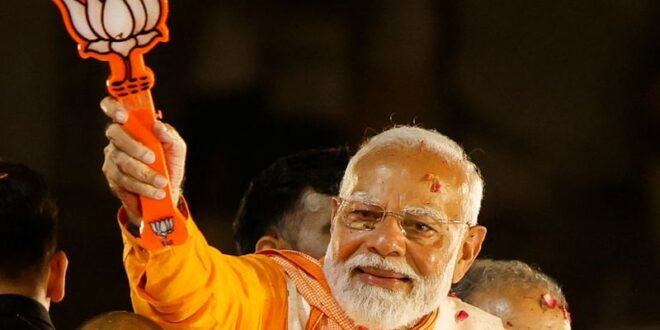NEW DELHI (Reuters) – India’s Prime Minister Narendra Modi is expected to win a record-equalling third consecutive term in office on Tuesday when the 642 million votes cast in the world’s largest election are counted.
Exit polls have projected a big win for Modi and if they are confirmed – they have often got the outcome wrong in India – Modi’s Hindu nationalists will have triumphed in a vitriolic campaign in which parties accused each other of religious bias and of posing a threat to sections of the population.
Investors have already cheered the prospects of another Modi term, expecting it to deliver for India further years of strong economic growth and pro-business reforms, while a possible two-thirds majority in parliament could allow major changes to the constitution, rivals and critics fear.
Nearly one billion people were eligible to vote in the seven-phase, seven-week poll which began on April 19 and concluded on June 1, held in searing summer heat with temperatures touching nearly 50° Celsius (122° Fahrenheit) in some parts.
Yet more than 66% of registered voters turned out, just one percentage point lower than the previous election in 2019, belying fears that voters might shun a contest thought to be a foregone conclusion in Modi’s favour.
Modi, 73, who first swept to power in 2014 by promising growth and change, is seeking to be only the second prime minister after India’s independence leader Jawaharlal Nehru to win three straight terms.
He began his campaign by showcasing his record in office including economic growth, welfare policies, national pride, Hindu nationalism and his own personal commitment to fulfilling promises which he called “Modi’s Guarantee”.
However, he changed tack after low voter turnout in the first phase and accused the opposition, especially the Congress party which leads an alliance of two dozen groups, of favouring India’s 200 million Muslims – a shift analysts said made the campaign coarse and divisive.
They said the pivot may have been aimed at firing up the Hindu nationalist base of Modi’s Bharatiya Janata Party (BJP) to draw them to vote. Modi defended himself against criticism that he is stoking divisions between Hindus and Muslims to win votes and said that he was only faulting the opposition campaign.
VERY HOPEFUL, SAYS OPPOSITION
The opposition INDIA alliance, led by Rahul Gandhi’s Congress party, denied it favoured Muslims in the Hindu-majority country and said Modi would destroy the constitution if he returned to power and end affirmative action enjoyed by the so-called backward castes. The BJP rejects this.
The opposition alliance also promised more welfare measures and handouts, with surveys saying unemployment, inflation and rural distress were the main concerns of voters.
TV exit polls released on Saturday after voting ended projected the BJP-led National Democratic Alliance could win a two-thirds majority in the 543-member lower house of parliament.
Several major polls projected the BJP alone could win more than the 303 it won in 2019.
The projections pushed Indian shares to lifetime highs on Monday while the rupee gained and bond yields dropped, as investors were buoyed by expectations of sustained economic growth.
Exit polls, which are conducted by polling agencies, have a patchy record in India, with analysts saying it is a challenge to get them right in the large and diverse country.
Opposition parties dismissed them saying they were unscientific and did not reflect reality.
“We are very hopeful that our results are completely opposite to what the exit poll is saying,” former Congress party president and Rahul Gandhi’s mother, Sonia, said on Monday.
(Reporting by YP Rajesh; Editing by Toby Chopra)
 BeritaKini.biz Berita Viral Terkini di Malaysia
BeritaKini.biz Berita Viral Terkini di Malaysia





